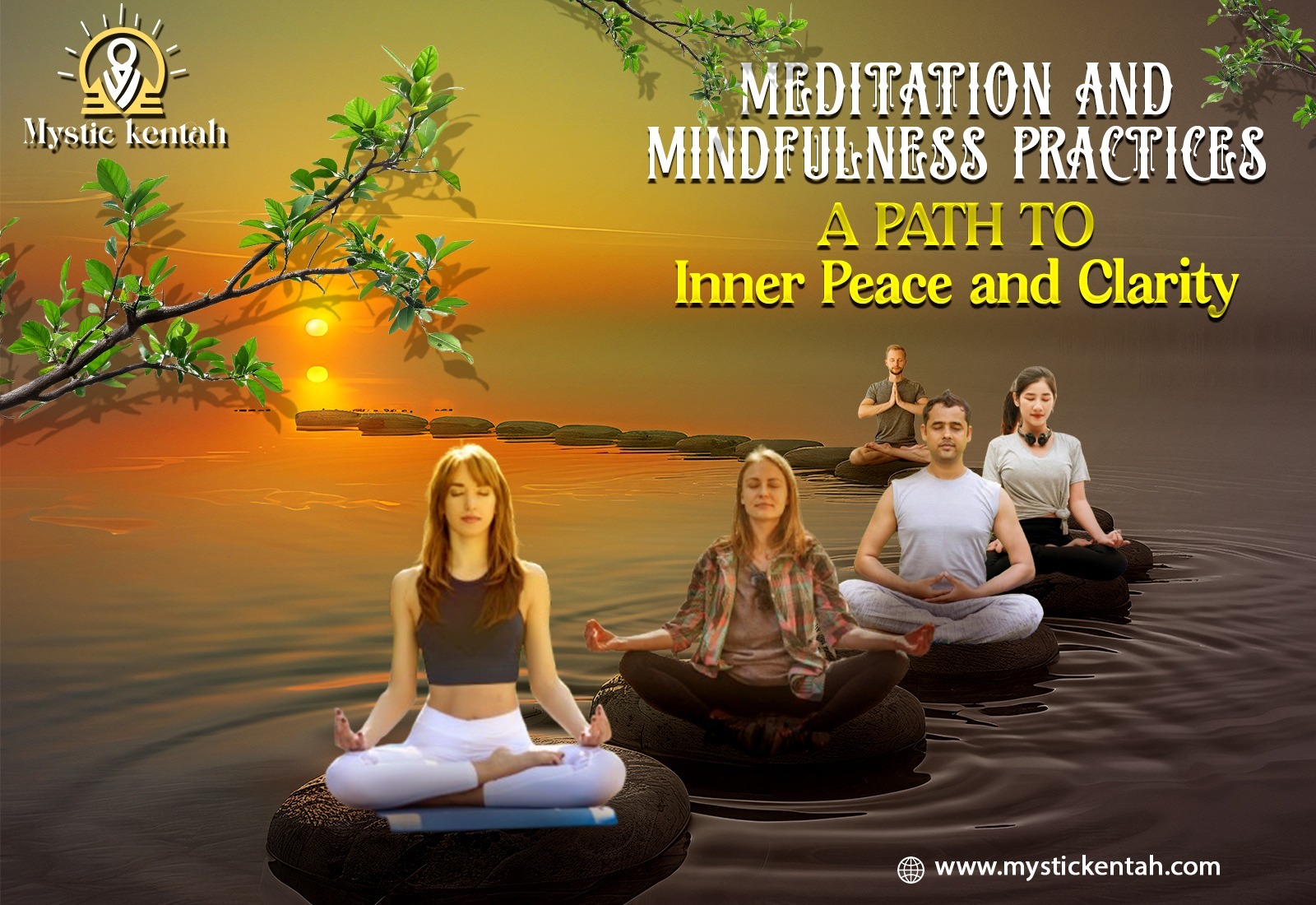Meditation and mindfulness practices have gained widespread attention as powerful tools for achieving inner peace, mental clarity, and emotional balance. These practices, which are deeply rooted in ancient spiritual traditions, have evolved into mainstream techniques used by people from all walks of life to reduce stress, enhance focus, and cultivate a sense of well-being.
At Mystic Kentah, we believe that meditation and mindfulness are essential components of spiritual growth and personal development, providing a gateway to higher consciousness and self-awareness.
This blog post will delve into the importance of meditation and mindfulness practices, how they work, their benefits, and how you can incorporate them into your daily life for transformative results.
What Is Meditation?
Meditation is the practice of focusing the mind and training attention and awareness. It is a technique that has been used for thousands of years across different cultures and spiritual traditions. The goal of meditation is to calm the mind, reduce distractions, and attain a state of mental clarity and emotional equilibrium.
At its core, meditation is about turning inward. It allows individuals to disengage from the constant stream of thoughts, emotions, and external stimuli, creating space for inner reflection and self-awareness. Meditation can take many forms, ranging from seated silent meditation to guided visualization, walking meditation, and even chanting.
What Is Mindfulness?
Mindfulness is the practice of being fully present in the moment, and aware of your thoughts, feelings, and surroundings without judgment. It involves paying attention to the here and now, rather than being preoccupied with the past or future. Mindfulness encourages a deep connection with the present, fostering an attitude of acceptance and non-reactivity.
Mindfulness and meditation are often practiced together, but they are not synonymous. Meditation is a specific technique, whereas mindfulness is a way of being. Meditation can enhance mindfulness by training the mind to remain focused, calm, and present in everyday life.
The Connection Between Meditation and Mindfulness Practices
While meditation and mindfulness are distinct practices, they complement each other in profound ways. Meditation helps to cultivate mindfulness by training the mind to focus and remain calm, which in turn supports mindfulness in daily life.
Conversely, mindfulness allows meditation practitioners to deepen their meditation by fostering a state of non-judgmental awareness and presence. For example, when you meditate, you may focus on your breath, body sensations, or a mantra.
During this process, you practice mindfulness by observing your thoughts and emotions without attaching to them or allowing them to control you. Similarly, mindfulness practices outside of formal meditation sessions—such as mindful eating, walking, or even working—can reinforce the focus and clarity you gain from meditation.
At Mystic Kentah, we encourage individuals to integrate both meditation and mindfulness practices into their spiritual journey, as these practices are key to deepening self-awareness and cultivating inner peace.
The Benefits of Meditation and Mindfulness Practices
1. Stress Reduction
One of the most well-documented benefits of meditation and mindfulness is their ability to reduce stress. When practicing meditation, the mind moves away from the worries of everyday life and enters a state of deep relaxation.
Similarly, mindfulness allows individuals to remain calm and composed, even in stressful situations, by fostering a sense of non-judgmental awareness and acceptance. Numerous studies have shown that regular meditation and mindfulness practices can lower cortisol levels (the body’s stress hormone), reduce anxiety, and alleviate symptoms of stress-related disorders.
At Mystic Kentah, we believe that stress reduction is a vital step toward spiritual growth, as it allows individuals to connect with their true selves and find balance amidst life’s challenges.
2. Enhanced Focus and Concentration
In today’s fast-paced world, distractions are everywhere. Whether it’s the constant barrage of information from our phones, work pressures, or personal responsibilities, staying focused can be a challenge.
Meditation and mindfulness practices train the mind to focus on the present moment, enhancing cognitive abilities such as concentration, memory, and problem-solving. Through regular practice, meditation strengthens the brain’s prefrontal cortex—the area responsible for decision-making, attention, and self-control.
Similarly, mindfulness helps practitioners develop greater mental clarity, allowing them to navigate complex situations with a calm and focused mind.
3. Emotional Regulation
One of the core principles of mindfulness is non-judgmental awareness. When practicing mindfulness, individuals learn to observe their thoughts and emotions without getting caught up in them. This detachment creates space for emotional regulation, enabling individuals to respond to challenging emotions in a calm and balanced manner.
Meditation, particularly loving-kindness meditation (Metta), can also foster compassion, empathy, and forgiveness—qualities that are essential for healthy relationships and emotional well-being.
At Mystic Kentah, we emphasize the importance of emotional regulation as a cornerstone of spiritual growth, as it allows individuals to move beyond reactive patterns and align with their higher selves.
4. Improved Physical Health
The mind and body are deeply interconnected, and the benefits of meditation and mindfulness extend beyond mental and emotional well-being. Research has shown that these practices can have a positive impact on physical health, improving immune function, reducing blood pressure, and enhancing sleep quality.
Meditation and mindfulness practices can also alleviate symptoms of chronic pain, digestive issues, and heart disease by promoting relaxation and reducing inflammation in the body. At Mystic Kentah, we believe that nurturing the body is just as important as nurturing the mind, and meditation and mindfulness are powerful tools for achieving holistic well-being.
5. Increased Self-Awareness and Spiritual Growth
Meditation and mindfulness practices are not just about relaxation or stress relief; they are also powerful tools for self-discovery and spiritual awakening. By quieting the mind and turning inward, individuals can access deeper layers of their consciousness, gaining insight into their true nature and purpose.
Mindfulness, in particular, fosters a heightened sense of self-awareness by encouraging individuals to observe their thoughts, emotions, and behaviors without judgment. This awareness allows individuals to recognize limiting beliefs and unconscious patterns, paving the way for personal and spiritual growth.
At Mystic Kentah, we view meditation and mindfulness as essential practices for those on a spiritual path. Whether you are seeking enlightenment, inner peace, or simply a deeper understanding of yourself, these practices offer profound opportunities for transformation.
How to Incorporate Meditation and Mindfulness Practices into Your Daily Life
Incorporating meditation and mindfulness into your daily routine doesn’t have to be difficult or time-consuming. Even a few minutes of practice each day can yield significant benefits. Here are some tips to help you get started:
1. Start with Small Sessions
If you’re new to meditation, start with short sessions of 5 to 10 minutes. Sit in a comfortable position, close your eyes, and focus on your breath. If your mind wanders, gently bring your attention back to your breath without judgment. Over time, you can gradually increase the duration of your meditation sessions.
2. Create a Quiet Space
Having a designated space for meditation can help you establish a consistent practice. Choose a quiet area where you won’t be disturbed, and consider adding calming elements such as candles, incense, or soft music to enhance your meditation experience.
3. Practice Mindfulness Throughout the Day
Mindfulness doesn’t have to be limited to formal meditation sessions. You can practice mindfulness in everyday activities such as eating, walking, or even washing the dishes. The key is to stay fully present in the moment, paying attention to your sensations, thoughts, and feelings without judgment.
4. Use Guided Meditations
If you find it difficult to meditate on your own, consider using guided meditations. There are many apps and online resources that offer guided sessions, which can help you stay focused and provide structure to your practice.
At Mystic Kentah, we offer guided meditation programs designed to help individuals deepen their practice and explore new dimensions of consciousness. Our sessions are tailored to meet the needs of both beginners and experienced meditators.
5. Be Patient and Consistent
Meditation and mindfulness are lifelong practices, and their benefits accumulate over time. It’s important to be patient with yourself and to approach your practice with a sense of curiosity and openness. Consistency is key—try to meditate or practice mindfulness every day, even if it’s just for a few minutes.
Conclusion:
Meditation and mindfulness practices are not just techniques for relaxation—they are gateways to deeper self-awareness, inner peace, and spiritual growth. Whether you are seeking relief from stress, greater emotional balance, or a deeper connection with your true self, these practices offer profound opportunities for transformation.
At Mystic Kentah, we believe that meditation and mindfulness are essential tools for anyone on a spiritual journey. By cultivating a regular practice, you can tap into your inner wisdom, align with your higher self, and experience the boundless peace and clarity that come from living in the present moment.
Through meditation and mindfulness, the path to spiritual awakening and self-realization becomes clear. It is a journey worth taking, and one that we are here to support every step of the way.

